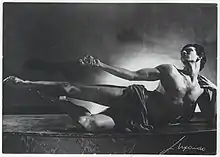Guido Lauri
Guido Lauri (23 November 1922 – 27 October 2019)[1] was an Italian dancer, actor, choreographer, ballet master, company director.
Guido Lauri | |
|---|---|
 Dance star Guido Lauri by Luxardo | |
| Born | 23 November 1922 Rome, Italy |
| Died | 27 October 2019 (aged 96) Rome, Italy |
| Occupation | Ballet dancer, ballet master, choreographer and company director |
| Years active | 1928–1990 |
| Spouse(s) | Anna Maria Paganini |
| Children | Tiziana Lauri |
| Awards | Honoris causa doctorate |
Born in Rome, he entered the ballet school of then Royal Rome Opera House at 6 years-old and in 1939, after a graduation with full marks, he joined the ballet company with the title of primo ballerino étoile.[2]
A very handsome man, an eclectic artist, a danseur noble with hot-blooded temperament,[3] he excelled in all the classics partnering famous ballerinas such as French Yvette Chauviré and Liane Daydée, French/Russian Ludmilla Tchérina and Italian Attilia Radice, often danced in neoclassical titles by Mikhail Fokin, Vaslav Nijinsky, Léonide Massine and created numerous roles for choreographer Aurel Milloss.
As a guest star, soon after the Second World War and during the 50s, he was very much in demand in Italy (La Scala in Milan, Teatro Regio in Turin, La Fenice in Venice, Teatro Comunale in Bologna, Maggio Musicale Fiorentino, Teatro di San Carlo in Naples, Teatro Massimo in Palermo) and abroad (Metropolitan Opera House in New York and Teatro Colon in Buenos Aires as well as in Germany, Austria, Switzerland, Portugal and Spain).
As a ballet master and choreographer, he directed the Rome Opera Ballet between 1965 and 1983 (collaborating with Erik Bruhn, Rudolf Nureyev, Roland Petit, Ninette De Valois, Pierre Lacotte) and, as a member of jury, he was invited by close friend Yuri Grigorovich in world-class dance competitions like those of Varna, Tokyo and Osaka.[4]
He worked for theatre with Luchino Visconti, for television with Vittorio Gassman,[5] for cinema with Bernardo Bertolucci and he was invited in Hollywood by Margarete Wallmann. Some of most talented artists of the time such as De Chirico, Guttuso, Picasso and prince Enrico D’Assia designed costumes and scene-painting for him.
He was awarded the Berlin's Golden Bear prize in 1941, the Rome's Tiber's twins in 1964, the Florence's Michelangelo's David in 1978.
In 1957 the Accademia Mondiale degli Artisti e Professionisti chaired by prince Ernesto Baranger awarded him an Honorary Degree, and in 1982 American Who's Who choose him as one of the greatest prides of the Italian ballet of the 20th century.
Married to ballet dancer Anna Maria Paganini[6] and father of ballerina Tiziana Lauri, he also counted among his relatives a large number of acclaimed dancers, famed athlete Eliseo Paganini and celebrated operatic bass Giulio Neri.[7]
References
- "Guido Lauri è morto/ Addio al maestro della danza: aveva 96 anni". www.ilsussidiario.net. Retrieved 2019-10-30."Guido Lauri è morto/ Addio al maestro della danza: aveva 96 anni". www.ilsussidiario.net. Retrieved 2019-10-30.
- Dal Costanzi al Teatro dell'Opera: dal 1947, Balletto.net Archived 2016-03-05 at the Wayback Machine
- Alberto Testa, Storia della danza e del balletto – Gremese.
- Balletto Oggi n°35, July 1986.
- Storia Rai 1955–56 Rai Tche Archived 2014-07-14 at the Wayback Machine
- Anna Maria Paganini, Ballet Archive
- Tiziana Lauri, Rome Opera Ballet's talented première danseuse – DANCE MAGAZINE, April 1987.
Sources
- Premio Guido Lauri per la danza, Morfoedro
- Enciclopedia dello Spettacolo, founded by Silvio D'Amico – Le Maschere, Roma (p.1281).
- Enciclopedia dello spettacolo, Garzanti (p.366).
- Cinquant'anni del Teatro dell'Opera 1928–1978, Bestetti editore 1979.
- Teatro dell'Opera di Roma, Archivio Storico.
- Who's Who in the World, Sixth Edition 1982–83 – Marquis Who's Who, Inc. U.S.A (p.630).
- Who's Who in Italy, 1987 (p.710).
- Guido Lauri: "La danza per me è una preghiera, una missione… dobbiamo essere sacerdoti di questa passione!", interview Il Giornale della Danza (February 2, 2011).
- Tiziana Lauri: "Noi tutti dobbiamo imparare a corporizzare lo spirito e a spiritualizzare il corpo", interview Il Giornale della Danza (September 23, 2011).
- Guido Lauri, la voce di un secolo di danza, interview GB Opera Magazine(August 22, 2015).